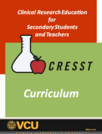
This is the first part of the Clinical Researcg Education for Secondary Students and Teachers.

This is the first part of the Clinical Researcg Education for Secondary Students and Teachers.
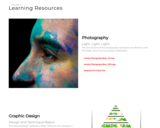
This text is a free resource by Thomas Payne. It provides basic information to first year students. Visit: http://faculty.wartburg.edu/payne/

Our goal is to present the key observations and unifying concepts upon which modern biology is based; it is not a survey of all biology! Once understood, these foundational observations and concepts should enable you to approach any biological process, from disease to kindness, from a scientific perspective. To understand biological systems we need to consider them from two complementary perspectives; how they came to be (the historic, that is, evolutionary) and how their structures, traits, and behaviors are produced (the mechanistic, that is, the physicochemical)
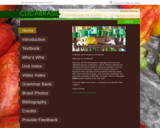
The Portuguese language lessons of ClicaBrasil highlight aspects of Brazilian culture. They are designed for intermediate to advanced students, but are accessible to everyone. Each lesson includes videos of Brazilians from all walks of life speaking naturally about their lives and their country. All lessons integrate reading, writing, listening and comprehension, grammar, vocabulary, oral communication and cultural activities with the videos. This is also available as a free PDF textbook and as print on demand.

This is a Google Slides that is to be used with the book Everything You Need to Ace Computer Science and Coding in One Big Fat Notebook, Unit 5, Chapter 15.
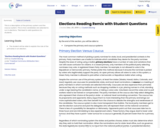
This is a description of the primary system and the caucus system. This is how candidates are selected to run in elections.
*Remixed to add questions for students.
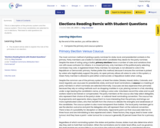
This is a description of the primary system and the caucus system. This is how candidates are selected to run in elections.
*Remixed to add questions for students.
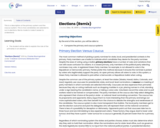
This is a description of the primary system and the caucus system. This is how candidates are selected to run in elections. Remix made to make it easier to understand.

Students will be able to explore the water cycle, by getting hands-on experience making the water cycle ! Using the examples, the students will be able to use various materials to practice creating a water cycle. Dive into water cycles and allow your students access to expand their knowledge using creativity!
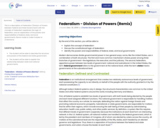
This is a description of Federalism (Division of Powers between Federal and State Government) with the concept of Federalism explained, the logic of federalism, and an explanation of the powers and responsibilities of federal, state, and local governments. Remix made to make it easier to understand.
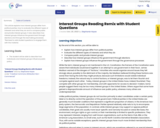
This article explains how interest groups differ from political parties, how to evaluate the different types of interests and what they do and to compare public and private interest groups. It also describes how interest groups influence the government through elections and through the lawmaking processes.
*Remixed to add student questions to engage them with the material.
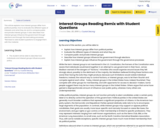
This article explains how interest groups differ from political parties, how to evaluate the different types of interests and what they do and to compare public and private interest groups. It also describes how interest groups influence the government through elections and through the lawmaking processes.
*Remixed to add student questions to engage them with the material.
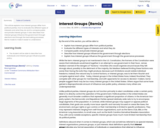
This article explains how interest groups differ from political parties, how to evaluate the different types of interests and what they do and to compare public and private interest groups. It also describes how interest groups influence the government through elections and through the lawmaking processes. Remix made to make it easier to understand.

This is a Google Slides that is to be used with the book Everything You Need to Ace Computer Science and Coding in One Big Fat Notebook, Unit 5, Chapter 16.
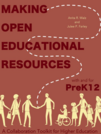
Welcome to Making Open Educational Resources with and for PreK12: A Collaboration Toolkit for Higher Education. This toolkit is designed to address known gaps in knowledge and practice which limit the development of generative relationship-building processes between higher education faculty and PreK12 educators.
Higher education and PreK12 are vastly different domains. Well-intended, collaborative relationships do not always result in hoped-for creation of useful and reusable learning materials for PreK12 classrooms, nor of effective partnerships.
The main landing page for this book is https://doi.org/10.21061/OER_PreK12_highered. The toolkit is also available at https://pressbooks.lib.vt.edu/higheredk12collaborationtoolkit. Associated slides, handouts, and other downloadables are available at this site and other sites linked within the toolkit. A print version is available for order here.
The toolkit is part of the Scholarly Communication Notebook and is intended to prepare and position practicing and future academic librarians and interested higher education faculty, staff, and students consulting with librarians to address gaps related to outreach to PreK12. It aims to expand use and re-usability of learning resources through informed practices regarding copyright, open-licensing, and accessibility. Designed for use in formal graduate-level library and information science courses and relevant for self-study by academic librarians already in practice, this toolkit includes videos, presentations, transcripts, activities, guides, assignments, and assessment tools for learning and delivery by librarians to faculty and students in higher education, and for use by interested instructional designers, other faculty, staff, and graduate students seeking to improve their service to PreK12 educators.
Are you a professor or academic librarian reviewing or using this toolkit? We would love to hear from you. Please use the form at https://bit.ly/interest_hek12 to leave your feedback.

Students will be able to explore the different continents by making a model of a continent of their choice! Using the globe, modeling clay, placemats, and other tools, the students will be able to use their creativity to produce a model of a continent. Dive into the different continents and allow your students access to expand their knowledge using creativity!

Students will be able to explore matter, by getting hands-on experience experimenting with salt, sugar, sand, color changing beads, and hot and cold water.! Using the materials, the students will be able to use various materials to practice how objects interact with water.. Dive into matters and allow your students access to expand their knowledge using information that is transmitted using computing devices, because the students will record themselves discussing their results from their experiment to share with their classmates.

Students will be able to explore the different ecosystems by constructing their very own ecosystem! Using the Makedo kit, the students will be able to use cardboard that is laying around to create their very own design. Dive into ecosystems and allow your students access to expand their knowledge using creativity!

PhD Science Grade Levels K-2 is available as downloadable PDFs. The OER consists of Teacher Editions and student Science Logbooks for every module.
With PhD Science¨, students explore science concepts through authentic phenomena and events-not fabricated versions-so students build concrete knowledge and solve real-world problems. Students drive the learning by asking questions, gathering evidence, developing models, and constructing explanations to demonstrate the new knowledge they've acquired. The coherent design of the curriculum across lessons, modules, and grade levels helps students use the concepts they've learned to build a deep understanding of science and set a firm foundation they'll build on for years to come.
Cross-curricular connections are a core component within PhD Science. As an example, every module incorporates authentic texts and fine art to build knowledge and create additional accessible entry points to the topic of study.
Three-dimensional teaching and learning are at the heart of the curriculum. As students uncover Disciplinary Core Ideas by engaging in Science and Engineering Practices and applying the lens of Cross-Cutting Concepts, they move from reading about science to doing science.
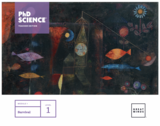
PhD Science Grade Levels K-2 is available as downloadable PDFs. The OER consists of the Teacher Edition and student Science Logbook.
Throughout the module, students study the anchor phenomenon, life at a pond, and build an answer to the Essential Question: How do pond plants and pond animals survive in their environment? As students learn about each new concept, they revisit and refine a model that represents how plants and animals survive in a pond environment. At the end of the module, students use their knowledge of the ways plants and animals survive to explain the anchor phenomenon, and they apply these concepts to a new context in an End-of-Module Assessment. Through these experiences, students develop an enduring understanding that plants and animals have body parts that function in ways that help the plants and animals survive in their environment. Students also develop the understanding that plants and animals of the same kind are recognizable as similar but can vary in many ways and that many animal parents engage in behaviors that help young offspring survive.
With PhD Science¨, students explore science concepts through authentic phenomena and events-not fabricated versions-so students build concrete knowledge and solve real-world problems. Students drive the learning by asking questions, gathering evidence, developing models, and constructing explanations to demonstrate the new knowledge they've acquired. The coherent design of the curriculum across lessons, modules, and grade levels helps students use the concepts they've learned to build a deep understanding of science and set a firm foundation they'll build on for years to come.
Cross-curricular connections are a core component within PhD Science. As an example, every module incorporates authentic texts and fine art to build knowledge and create additional accessible entry points to the topic of study.
Three-dimensional teaching and learning are at the heart of the curriculum. As students uncover Disciplinary Core Ideas by engaging in Science and Engineering Practices and applying the lens of Cross-Cutting Concepts, they move from reading about science to doing science.